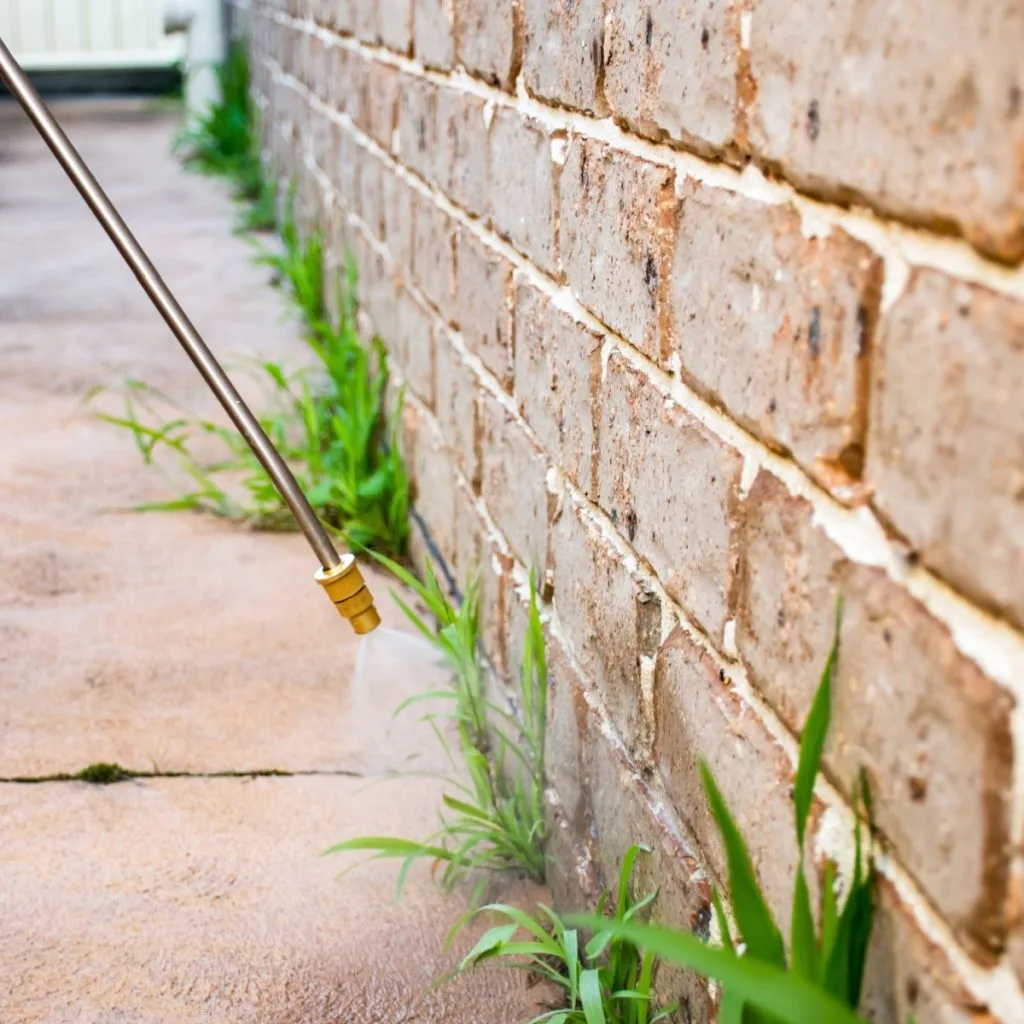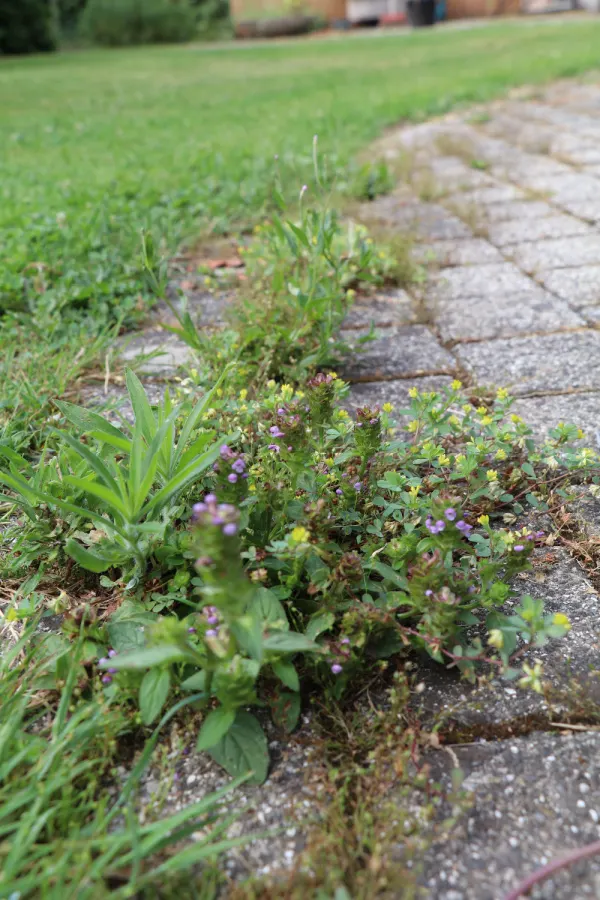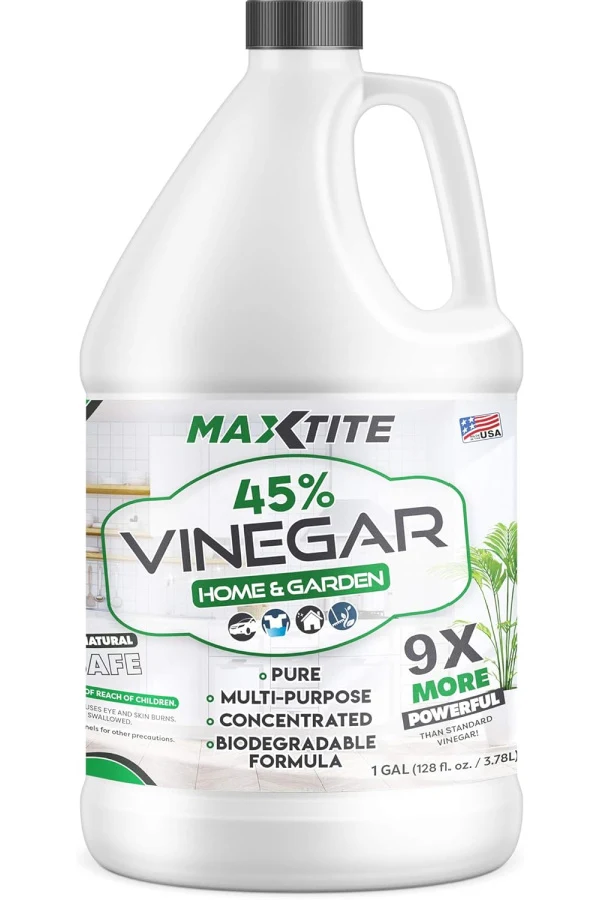If you need to find an effective way to get rid of weeds in your driveway, sidewalks, gravel paths, or even your garden beds without resorting to commercial weed killers – it’s time to stop weeds with vinegar. Or more specifically – horticultural vinegar!
Believe it or not, this powerful vinegar can even take down some of the most stubborn weeds out there, like thistle, crabgrass, and bindweed. And because it’s all-natural, you don’t have to worry about leaving harmful residues behind or risking the health of nearby insects like bees and butterflies.
Not only is it easy to apply, it’s also a much safer option than chemical weed killers. Especially if you have pets, kids, or wildlife around!

Many of the weed sprays sold in stores can leave chemicals in the soil for months – or even years. And that’s not to mention the potential danger they pose to animals, people, and important insects that come into contact with them.
That’s where horticultural vinegar comes in. With its strong acidity, it can knock out weeds fast – without the risks of chemical sprays.
How To Stop Weeds With Vinegar
What Makes Horticultural Vinegar So Effective?
Most vinegar you find at the grocery store has about 5% acidity. That kind can be useful for small or newly sprouted weeds. But it won’t do much against thicker, more established weeds.
Horticultural vinegar, on the other hand, is much stronger. Its acidity usually ranges from 20% up to 40%. That’s a huge jump and it makes a big difference when it comes to killing weeds down to their roots.
The higher acidity burns the top of the weed on contact and can even soak into the soil to affect the roots. This helps prevent the weed from regrowing and also makes it harder for new weeds to sprout in the future.
You can still use household vinegar for little weeds that pop up in cracks or garden edges, but for serious weed problems, horticultural (also labeled industrial) vinegar is the better tool for the job. Affiliate Link: 45% Vinegar – Ultra-Strength Concentrate for Home & Garden
How Vinegar Works To Kill Weeds
When you spray vinegar on a weed, the acid goes to work immediately. First, it burns the surface of the plant, including the leaves, stems, and any exposed parts. Then, if the vinegar gets into the soil, it can be absorbed by the roots. This is especially helpful for strong, deep-rooted weeds.
Over time, the acid breaks down and makes the soil less friendly for weed seeds to sprout again. That’s why it’s best to use horticultural vinegar in areas where you don’t plan to grow other plants, such as gravel paths, along fences, or in cracks in your sidewalk or patio.
If you want to use it in your garden or flowerbeds, you need to be careful to only spray the weed directly and avoid getting any on your plants nearby.
Picking The Right Strength Vinegar
Not all horticultural vinegar is the same. The stronger the acidity, the more powerful it will be. If you’re trying to stop weeds in walkways, driveways, or gravel areas, look for a vinegar product with at least 30% acidity. You can even mix it with water if needed to make a slightly less strong solution for smaller jobs.
A 50/50 mix of 30% vinegar and water will still be strong enough to kill many types of weeds. For tougher ones, you may want to use the vinegar full strength without adding water. Just remember, the higher the acidity, the more carefully it needs to be handled.

How To Safely Mix And Use Horticultural Vinegar
Although vinegar is natural, horticultural vinegar is still a strong acid and should be handled with care. Always wear gloves and protective eyewear when mixing or spraying it. Keep it away from kids and pets, and store it in a safe place when not in use.
To make your spray even more effective, you can add a few drops of liquid dish soap per quart of vinegar. The soap helps the vinegar stick to the leaves of the weed better, increasing its effectiveness.
For small areas or single weeds, a handheld spray bottle works great. If you’re spraying a larger space like a driveway or long path, a pump sprayer or backpack sprayer can make the job much faster.
When To Spray Vinegar For Best Results
The best time to spray vinegar to stop weeds is on a hot, sunny day in the early afternoon. The sun helps dry out the weed faster and works with the vinegar to burn the plant quickly. Heat and sunlight speed up the process and make the vinegar work even better.
Avoid spraying when it’s windy, rainy, or dewy. Wind can blow the vinegar onto nearby flowers, vegetables, or grass and damage them. Rain or dew can dilute the vinegar, making it less powerful.

You don’t need to drench the plant in vinegar. A light, even coating that fully wets the leaves is enough. For weeds in garden beds, spot spray only the weed and shield your other plants.
Using Vinegar To Stop Weeds In Garden Beds And Lawns
If you have hard-to-kill weeds like bindweed or thistle popping up in your flowerbeds or even your lawn, horticultural vinegar can still help. You just have to be precise. It’s helpful to do this early in the morning when there’s no breeze, so you don’t risk hitting nearby plants.
You can even use a piece of cardboard or plastic to shield your good plants while you spray the weed. Once sprayed, the vinegar will usually begin working within hours, especially if it’s warm outside. See our article: How To Eliminate Thistles From Your Lawn, Garden & Beds – With One Simple Secret!
How Long It Takes To Work
You’ll usually start to see results within 24 hours if the temperature is warm and sunny. The weed’s leaves will wilt and turn brown as the acid takes effect. On cooler or cloudy days, it may take longer.
Big weeds with deep roots may take more than one treatment to fully die off. But once they’re gone, the area should stay weed-free for longer. Especially if you keep spraying small weeds as soon as they appear. For more uses of vinegar in your landscape, see our article: How To Kill Poison Ivy For Good – With Vinegar!
Here is using vinegar to stop the weeds around your home – and to keeping bees, pollinators and your soil safe from harmful sprays!
Simple Garden Life
Follow Our Facebook Page For Even More Great Tips! Simple Garden Life Facebook Page
Simple Garden Life is a website dedicated to keeping gardening fun, simple and enjoyable! We publish two new articles each week along with a new garden podcast episode every two weeks. This article may contain affiliate links.

